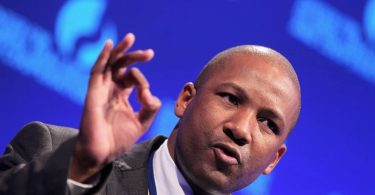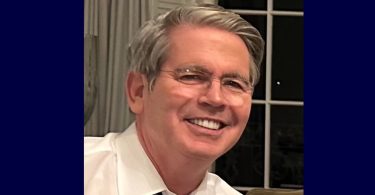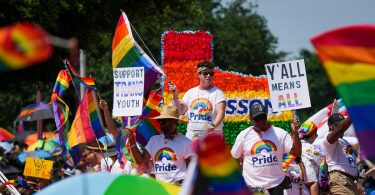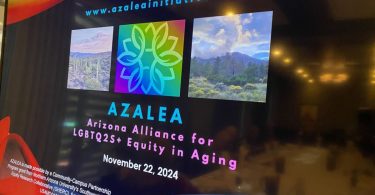In Uganda, the country’s constitutional court is expected to rule on a law that threatens finds life imprisonment, even death just for being gay.
Ugandan civil rights groups challenged the anti Homosexuality Act in December and the United States has joined a growing international outcry by sanctioning Uganda by restricting visas and withholding trade.
Ali Rogan spoke with two Ugandan LGBTQ plus activists, including one who just survived an attempt on his life.
And we should warn you that some of the images in this report may be disturbing for some viewers.
The man that tried to cut my neck shouted What’s in the local language of Lagonda from C as it where which is translated that you almost sexual Stephen Kabuye is the executive director of the advocacy group Colored Voice Truth to LGBTQ.
He’s faced death threats since March because of his sexuality.
Then last month, he filmed himself on the ground clinging to life after being stabbed repeatedly by unknown assailants outside his home.
He’s now receiving care outside Uganda.
But kaboom, he says.
The police seemed more focused on his being gay than on the attack.
People want to do in my life, and the police was really looking into my sexuality and everything.
And two days later when they came to get a settlement from me.
They kept on asking me how I became.
Gay activists say that this is the new normal for the LGBTQ plus community Since the Anti Homosexuality Act became law last May it calls for life imprisonment for having gay sex and imposes up to 20 years in prison for anyone promoting homosexuality, and it calls for the death penalty for having same sex relations with minors, disabled persons or people with HIV.
A majority of Ugandans support the controversial law.
And most of its main enforcers have been everyday citizens.
A coalition of rights groups documented 281 instances of vigilante abuses against LGBTQ, plus people last year versus 25 Times When the government was behind the abuse, some suffer in silence and can’t rely on friends or family person.
I thought society be cooler of public.
My family was like if they miss they give you they told me themselves, Even if they give you the desk and things first, we shall sit as justice.
Because we believe in God.
The law’s fate is ultimately up to Uganda’s constitutional court.
But the United States and others have stepped up pressure to repeal the law and protect the country’s LGBTQ plus community.
Last August, the World Bank halted new loans to Uganda and in December the U.
S imposed visa restrictions on hundreds of Ugandan officials and their families.
Ugandan President Yoweri Museveni dismissed the actions.
They tried to put pressure on US pressure.
If you don’t do this, we shall not give not allow you to go to America.
I don’t want to go to America.
This isn’t the first time Uganda has grappled with a law like this.
In 2014, a similar but less restrictive law drew protests.
The court overturned it on procedural grounds following Western sanctions and suspension of aid.
For more we turn to Claire Br Rugamba and LGBT Q.
Plus activist.
She’s the equality and nondiscrimination coordinator for Chapter four Uganda a civil rights group.
Claire.
Thank you so much for joining us.
How has this law affected you personally, if you wouldn’t mind sharing Also, how is it affected Your community?
Thank you so much for having me as an LGBT community.
We are.
We are really facing one of the worst experiences that anyone can go through.
We?
We We see that these laws are form of state sponsored homophobia and transphobia.
The very purpose of this law is to specifically a raise.
They already be discriminated from the rest of us.
But we are fighting back.
We understand that the constitutional court is set to rule any day on the constitutionality of this law.
What are your hopes for the outcome of that ruling and how would it affect the implementation of the law?
We’re asking courts to look at the substantive arguments that we have putting petitions to declare that this law is unconstitutional on substantive grounds to protect and enshrine the rights of LGBT individuals, because this means that once the courts if they’re independent enough declared this unconstitutional, it would mean that the risk of having another anti gay law very low and of course, the world is watching and especially The African countries that are thinking of proposing or passing similar laws.
They’re washing to see what happens in Uganda since this law’s implementation.
How has it affected?
The ability for LGBTQ plus communities to access healthcare, particularly in the context of Uganda’s fight to eradicate AIDS.
So this law has been has rolled back down the current trend that Uganda was on to reach zero infections by 2030.
We see that the LGBT community, particularly men who have sex with men, gay men and transgender individuals failing to go to hospitals for care, because the law requires doctors to report suspected, Um LGBT individuals, all those that are suspected to be involved in some sex, sexual activity, causation or otherwise, Um, so this has rolled back really the progress that Uganda had met in the past.
How popular is this law with Ugandan citizens?
Overall, we see our insiders of particularly US evangelical extremists coming to Uganda coming to other African countries, saying this is something that you have to focus on.
So we are seeing.
Ah, it’s kind of a form of recolonization where US evangelical extremists Have lost ground in their own countries.
And they see Africa has grown zero.
We often say that, um, that homophobia is not a homegrown fight.
You know, Africans don’t hate each other.
Someone has radicalized them.
Someone has to tell them lies Force allegations that it was your duty individuals recruiting their Children or that we have this this plan to eradicate that traditional family in Uganda.
So this dangerous rhetoric has unfortunately is unfortunately being believed by the ordinary citizen of Uganda, and in turn their their they have become.
Vigilantes.
What do you make of the response?
That the international community has had to this law, particularly from countries where protections for LGBTQ plus communities do exist.
We have called for international solidarity with called for international pressure, and it’s working because without without international pressure, I would probably be in jail at this moment has the United States in particular done enough?
The United States has done quite a lot Monday.
I will applaud the U.
S government for for for responding to our call for sanctions by thing, Um, financial, um, and visa restrictions, but they just government can do so much more.
We that there was government is is seen as a leader in protection of international human rights.
So it’s important that the government continues to do more in terms of applying pressure and increasing that.
Yeah, the sanctions best against proven individuals that are, uh blood and truly promoting the violations of energy, bt individuals and opposition leaders.
We know that any country any countries, democracy is measured in how it treats its minorities and in this case, they they’ve gone and government is failing us next failing to protect us.
It is putting us at risk every day, and this is an accepted in any Democratic country.
Claire Br Rugamba, an activist with the Civil Rights organization.
Chapter four Uganda Thank you so much for your time.
Thank you, Ali.






